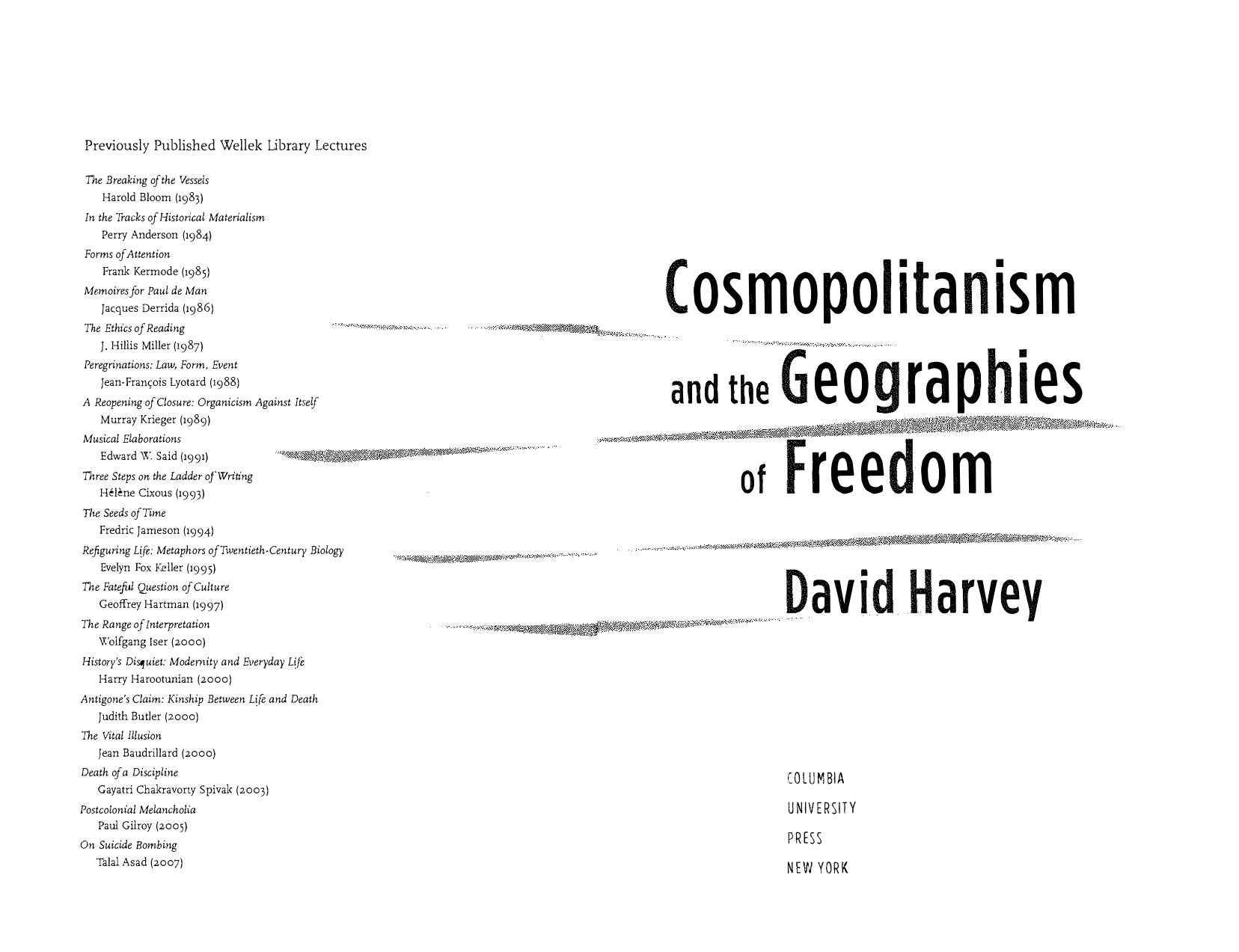Cosmopolitanism and the Geographies of Freedom (The Wellek Library Lectures) by David Harvey

Author:David Harvey [Harvey, David]
Language: eng
Format: epub, pdf
Tags: Political Science/History and Theory
Publisher: Columbia University Press
Published: 2009-07-01T04:30:00+00:00
Ideas of Place, Region, and Territory
Like “space” and “nature”, the idea of “place” turns out to be a multilayered and messy geographical concept. To begin with, we use many generic terms, such as place, region, area, territory, and locality, to identify a distinctive and usually bounded space as if it is a relatively permanent and separable entity endowed with particular and distinctive qualities. A series of cognate descriptive terms, such as city, village, hamlet, state, fiefdom, administrative district, neighborhood, and even community and home and hearth, as well as more technical-sounding determinations, such as ecosystem, microclimate, topographic region, or landscape, effectively describe some distinctive and coherent assemblage of particular phenomena in a bounded space. The metaphorical usages of place are also important—we all know what it means to feel “out of place” or to be “put in our place,” and those metaphorical meanings often flow into physical designations, such as being “in the wrong place at the wrong time” or “on the wrong side of the tracks.” But the saying that “there is no place like home” signals the role that deep emotions (both positive and negative) might play in shaping our conceptions, identities, and actions. The sense of belonging and not belonging (and hence of identity and otherness) is closely intertwined with ideas about place and territory. Place has so many cognates that it seems in itself to require a small indexical dictionary of intersecting meanings.
Geographers, for their part, have traditionally preferred the term region to place and have sometimes sought to define their discipline around the practices of regional geography (Pattison’s “areal tradition” is of this provenance). But, as Raymond Williams notes from a study of literary uses of region, there is a “definite tension” within that word “as between a distinct area and a definite part.” If the latter, then the question that immediately follows is: a part of what? and to what degree the part is subordinate to some whole. Regional, along with provincial, “are terms of relative inferiority in relation to an assumed centre.” Regional studies are therefore frequently considered less important than, if not intellectually inferior to, the more universal and hence more central studies of liberal or cosmopolitan theory (thus typically placing geography as a discipline in an inferior position within the academy compared to, say, economics). Yet regional also “carries implications of a valuably distinctive way of life,” thus making “the distinctive virtues of regions the basis for new forms of identity or degrees of self-government.” The regional or the local is seen as the site of authenticity and lived meaning.6 This was the line of thinking taken by the nineteenth-century French regional geographer, Vidal de la Blache, whose ideas influenced the French Annales school of historians (Fernand Braudel’s work on the Mediterranean lies in this tradition, for example). This is the path taken by all those interested in vernacular architecture, the power of regional traditions, and the role of place-bound collective memories in grounding our sense of the world. Vidal did
Download
Cosmopolitanism and the Geographies of Freedom (The Wellek Library Lectures) by David Harvey.pdf
This site does not store any files on its server. We only index and link to content provided by other sites. Please contact the content providers to delete copyright contents if any and email us, we'll remove relevant links or contents immediately.
| Anarchism | Communism & Socialism |
| Conservatism & Liberalism | Democracy |
| Fascism | Libertarianism |
| Nationalism | Radicalism |
| Utopian |
The Secret History by Donna Tartt(19053)
The Social Justice Warrior Handbook by Lisa De Pasquale(12187)
Thirteen Reasons Why by Jay Asher(8893)
This Is How You Lose Her by Junot Diaz(6877)
Weapons of Math Destruction by Cathy O'Neil(6265)
Zero to One by Peter Thiel(5787)
Beartown by Fredrik Backman(5737)
The Myth of the Strong Leader by Archie Brown(5500)
The Fire Next Time by James Baldwin(5431)
How Democracies Die by Steven Levitsky & Daniel Ziblatt(5215)
Promise Me, Dad by Joe Biden(5141)
Stone's Rules by Roger Stone(5081)
A Higher Loyalty: Truth, Lies, and Leadership by James Comey(4954)
100 Deadly Skills by Clint Emerson(4921)
Rise and Kill First by Ronen Bergman(4780)
Secrecy World by Jake Bernstein(4741)
The David Icke Guide to the Global Conspiracy (and how to end it) by David Icke(4709)
The Farm by Tom Rob Smith(4502)
The Doomsday Machine by Daniel Ellsberg(4484)
